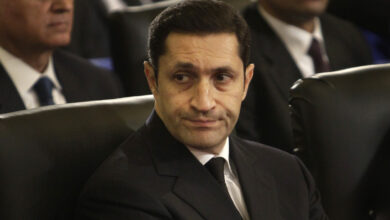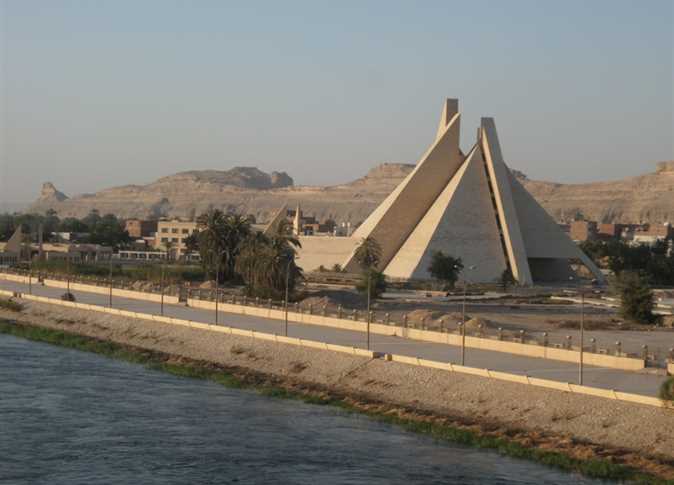There is a tiny part of post-revolution Cairo that will remain forever Mubarak, and that is Mostafa Mahmoud Square.
It was here that Hosni Mubarak supporters gathered on 2 February 2011, one of the bloodiest days of the revolution, when pro-Mubarak mobs on camels and horses attacked protestors in Tahrir Square.
The square has been their spiritual home ever since, a small but pointed riposte at the masses of anti-regime demonstrators who filled Tahrir Square demanding Mubarak’s removal – and who have continued to gather there sporadically since his resignation on 11 February to lobby for the revolution's unfulfilled demands.
Much of the language Mubarak supporters use, and the methods they employ to mobilize, are identical to those used by their pro-revolution anti-Mubarak counterparts. It all has a certain ying and yang quality to it.
Friday’s protest in Mostafa Mahmoud Square was advertised on Facebook as the “third revolution: the revolution of anger by Mubarak’s children.” (The “second revolution” was held in Tahrir Square earlier this month by the other side.) The tagline declared that “the big man (al kebeer) won’t be humiliated and because of that I’m going to the square.”
By 2 pm on Friday a stage had been erected and a handful of Mubarak devotees had assembled around it, with A5-size photographs of the big man in various familiar poses strung around their necks: the 1981 official state portrait; resting his chin on his knuckles smiling enigmatically; tieless in 2005; kissing the ka’aba on pilgrimage.
Huge posters had been hung behind them. “Leave our father alone, that's enough, you've made our lives hell," one declared in red letters.
“We Chose Him”, Mohamed Tharwat’s ode to al kebeer, rang out over the square. This was followed by audio of Mubarak taking the oath against mournful violins. The crowd occasionally broke out into chants of “the people want the president’s freedom.” A speaker instructed protestors to raise their voices “so the president can hear us in Sharm el-Sheikh.”
Young men strode purposefully around. One was Hassan al-Ghandour, who introduced himself as a protest organizer and “former soldier in the Republican Guards”.
Ghandour says that he “never experienced injustice” under Mubarak – not even when forced to travel to Italy to find work because he couldn’t find any in Egypt.
“There wasn’t any work in the country appropriate for my ambitions, but I didn’t blame my own failure on the country or Mubarak,” Ghandour – who called Mubarak “al-general” – said.
The conversation soon and inevitably turned to the revolution, and Ghandour laid out his theory about the causes of and actors behind the uprising.
It was a geopolitical pot pourri of conspiracy theory spanning centuries.
During the revolution “Persian-Iranian” and Israeli ammunition was used, Ghandour said, tying in with his theory that “Years ago the Jews and Persians agreed on the destruction of the Islamic state”.
“What happened to the Prophet Mohamed and Salah Eddin is happening to President Hosni Mubarak. Hosni Mubarak and [head of the ruling Supreme Council of the Armed Forces] Tantawi were the last people to humiliate the Jews. If you look at Wikileaks you will see that Mubarak and Tantawi are the last remaining obstacle to America’s division of the Middle East.”
The revolution was carried out by activist groups “the 6 April Youth Movement and Kefaya” who “were trained in Freedom House in America and also Serbia.”
Ghandour went on to list the names of individuals and entities he says have “sold” Egypt, including politician Ayman Nour, Wael Ghonim, Mohamed ElBaradei, activists Israa Abdel Fatah and Asmaa Mahfouz, and the public prosecutor.
Protestor Heba Farouq said that the revolution was “planned”.
“The Muslim Brotherhood and ElBaradei did the revolution. It was planned. There was an interview with ElBaradei in October 2011 on Al Jazeera when he said that things will change at the beginning of next year and we won't be silent.”
Speaking on stage, protest organizers variously referred to the revolution as a “scam” and “the revolution of the drug addict.” One questioned why nobody has been held to account for the deaths of police officers during the revolution.
Ghandour was one of several protestors who questioned the identity of the almost 1000 people killed during the revolution. “There were 170 convicted criminals amongst the people who died in during the revolution. What were convicted criminals doing among intellectuals?”
Asked why they are not happy with the revolution when it is now held up internationally as a model of peaceful regime change, Yasser al-Ghayesh said it is because “the world wants Egypt’s destruction.”
Ghawash described Mubarak as “his father, mother and brother” adding “I will eat anyone who comes near him.” He dismissed allegations of corruption leveled against the ex-president.
“These people talk about corruption when it is the people themselves who spread corruption. Where did President Mubarak come from? From the people. It is the people who must change.”
Magdy Mahmoud Fouda, coordinator of The Popular Campaign for the Defense and Support of President Mubarak, said “There was some corruption [during Mubarak’s tenure], but only the corruption expected in any country in the world”.
Fouda added that his group is currently gathering signatures for a petition calling for all criminal charges against Mubarak to be dropped and for him to be honored officially. So far 200,000 people have added their names.
There was unanimous agreement that Mubarak is innocent of all the criminal charges leveled against him. A man introduced as a physics professor explained at length that alleged irregularities in gas sale transactions with Israel were in fact “efforts by Mubarak and Hussein Salem [a former intelligence officer recently arrested in Spain] to get the best price for Egypt.”
Farouq said there is “no way” that Mubarak gave the order to kill protestors during the revolution. “There is no way that a man who fought and risked his life in the 1973 war would give an order for his people to be killed”.
Protestors made reference to Mubarak’s “many achievements” although when pressed seemed unable to list anything other than “not leading Egypt into war” and “infrastructure”.
Dalia Mahmoud mentioned “the biggest army in the Arab world” and the “biggest underground metro in the Arab world”.
“The stupid people who talk about 30 years of injustice weren’t living in Egypt for sure. Those of us who were around at the end of the 1970s know what the country was like when he took over, and what Egypt is like today,” Mahmoud said.
Many yearned wistfully for the return of life under Mubarak. A woman on stage started sobbing dramatically while describing how every day she wakes up and wishes that “she was still living in Mubarak’s Egypt.” Farouq complained about the “lack of security and stability Egypt is currently experiencing”.
University lecturer Sherif Imad – who says he participated in protests on 25 January but went home when protestors “started attacking the police” – said people want security and the “country to go back to how it was … what have we benefited from the revolution?”
Protestors have two things in common with their pro-revolution counterparts; consternation about who will next rule Egypt and a suspicion of the press, although in these protestors’ case it borders on revulsion. Ghandour explained that “the whole media is controlled by three companies. So they sing the song they want them to sing. Yesterday the people were with Hosni Mubarak. Now the same media figures who used to support Mubarak criticize him.”
As Al-Masry Al-Youm sought shelter from the sun under an advertising hoarding one of a group of protestors doing likewise said audibly, “the most disgusting people in Egypt are journalists and media figures.”
Protestor Mohamed Saad explained that ElBaradei will not be able to unite Egypt’s various political factions, while Ghandour is adamant that only a military man “can control the country”.
By 5 pm a huge “We Are All Mubarak” poster had been erected on stage but numbers remained low – at around 300. Asked why this was, Imad said that many of them were women and girls “and afraid to come” and also pointed out that it was an extremely hot day, “unlike when they did their revolution and they had the advantage of it being winter.”
A speaker reassured the tiny crowd before him. “We are millions. We are the silent majority.”
Towards the end of the day, a few people had to go to hospital for treatment after clashes broke out with passersby.




